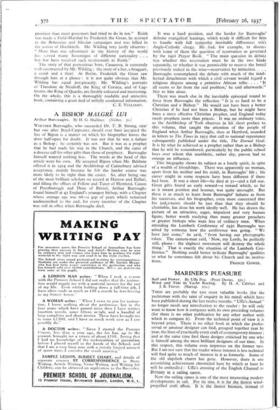A BISHOP MALGRE LU1
Arthur Burroughs. By H. G. Mulliner. (Nisbet. is.)
WHETHER Burroughs, who succeeded Dr. T. B. Strong, next
but one after Boyd-Carpenter, should ever have accepted the See of Ripon is a matter on which his biographer leaves the door half-open for doubt. It was not that he was a failure as a Bishop ; he certainly was not. But it was as a prophet that he had made his way in the Church, and the cares of a diocese call for other gifts than those of prophecy. Burroughs himself wanted nothing less. The words at the head of this article were his own. He accepted Ripon when Mr. Baldwin offered it in 1924 and the Archbishop of Canterbury advised acceptance, mainly because he felt the harder course was more likely to be right than the easier. So, after being one of the most brilliant scholars on record at Harrow and Balliol, and filling the offices of Fellow and Tutor of Hertford, Canon of Peterborough and Dean of Bristol, Arthur Burroughs found himself at 43 England's youngest bishop, with a Chapter whose average age was 66—a gap of years which remained undiminished to the end, for every member of the Chapter was still in office when Burroughs died. It was a hard position, and the harder for Burroughs' definite evangelical leanings, which made it difficult for him to handle with full sympathy_ inevitable differences with Anglo-Catholic clergy. He had; for example, to discass with some of them the question_ of reservation as governed by the i928 Prayer Boole. "The main question in debate was whether this reservation must be in the two kinds separately, or whether it was permissible to reserve the bread previously soaked in the wine—reservation by intinction. . . . Burroughs contemplated the debate with much of the intel- lectual detachment with which a civil servant would regard a religious dispute among a primitive African tribe. . . . ' It all seems so far from the real problem,' he said afterwards." Not to him alone.
There was much else in the inevitable episcopal round to force from Burroughs the reflection "It is so hard to be a Christian and a Bishop." He would not have been a better Christian if he had not been a .Bishop, -but he might have been a more effective Christian prophet, and England today needs prophets more than priests. It was, no ordinary voice, as the Archbishop OrYork observes in his short preface to this volume, that caught the - attention of the people of England when Arthur Burroughs, then at Hertford, sounded in letters to The Times in 1915 that call to national repentance subsequently published under the title, The Eternal Goal. It is by what he achieved as a prophet rather than as a Bishop that he will be remembered, particulaily. by the public school boys over whom this unathletic, rather shy, parson had so strange an influence.
This biography shows its subject as a lonely spirit, in spite of a wealth of friendships. There was aPparently no woman, apart from his mOther and his sister, in Burroughs' life ; his career might in some respects have been different if there had been. It was a short life—he died at 5 r—and a full one. Great gifts found 'an early reward—i reward which, so far as it meant position and honour, was quite unsought. But there is as much- to learn from Burroughs' failures as from his successes, and his biographer, even more concerned that his judgarients should be just than that they should be charitable, has done his work ideally well. He has drawn the picture of an attractive, eager, impatient and very human figure, better worth studying than many greater preachers or .greater bishops who were less of ordinary men. When attending the Lambeth COnference of 193o Burroughs was asked' by someone how the conference was going. " We have just come," he said, " from having our photographs taken. The camera-man said, Now, my Lords,.be perfectly still, please : the slightest movement will destroy the whole thing.' That is exactly the situation of the Lambeth Con- ference." Nothing could better indicate Burroughs' qualities or what he sometimes felt about his Church and its institu-


















































 Previous page
Previous page